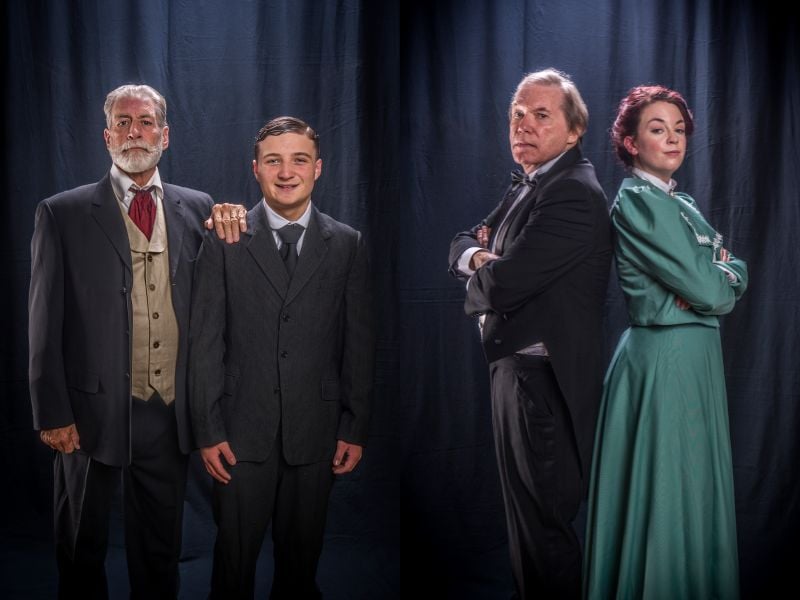Colonial Players of Annapolis’ production of The Winslow Boy is a passionate call for justice. Terence Rattigan’s 1946 play, based on an actual incident, follows an early 20th-century British family’s attempts to prove the innocence of their teenage son, who was accused of stealing. Directed by Mary Fawcett Watko, it is a compelling historical drama that still resonates today.
Drew Saint Amour brings a youthful innocence to Ronnie, the accused 13-year-old Navy student. He paces around the stage trembling in fear and protesting, hurling himself into his mother’s (Meg Venton) arms for comfort. Trying to stay awake during a late-night recap of the case, he pinches himself before falling asleep on the sofa.

Nicholas Martinez plays Dickie, Ronnie’s older brother, with a casualness hiding deep feeling. He tries to console Ronnie by sharing stories of his own filching of things during his schooldays. Later, as the case affects his prospects, he tries to keep calm, passing it off as nothing, but gives occasional outbursts.
Melanie Gordon gives a great drive to Ronnie’s older sister Catherine. A fighter for women’s right to vote, she pursues Ronnie’s case no matter the cost, determined to show the government unjust. She views the family’s advocate (Greg Jones) with cynical suspicion, especially with his conservative record.
Tom Newbrough brings a passion to Arthur, Ronnie’s father. Initially intimidating, he needles Dickie for his poor showing at Oxford and interrogates Ronnie, demanding he tell him the truth. Pursuing the case no matter what, he interrupts the advocate’s questioning of Ronnie. Using a cane and later a wheelchair, he shows strength and stubbornness, guided by Catherine.
Meg Venton plays Ronnie’s mother Grace with a take-charge attitude. Comforting Ronnie, she sends him up to change before his father sees him. During the case, she tearfully questions Arthur whether it is worth the damage it is causing the family. Later she directs everyone to the courthouse, energized by the vigorous back and forth of the courtroom.

Greg Jones brings a coldness concealing great feeling as the advocate Sir Robert Morton. Questioning Ronnie, he cross-examines him, getting into great detail and interpretations and powerfully distressing Ronnie. Later, he shows his determination that “right may be done,” casually dismissing what he has given up for the case. Slyly reproaching Catherine for her suffragette actions, he later reveals a grudging admiration for her skill.
Mary C. Rogers brings a lightness to Violet, the maid. She is tender toward Ronnie, amazed that such a boy could create such a ruckus in society. She joyfully tells the story of the trial’s ending, with brief tears. Tristan Poje plays Catherine’s fiancé John with a quiet conservatism, defending the Navy’s actions before apologizing to Catherine. As the case progresses, he throws up challenges to the engagement, seeing the family’s attempts for justice as “a bother.”
Eric Lund gives a quiet firmness to Desmond, the family solicitor. Initially awkward with John, Eric bonds with John over a mutual love of cricket. Later, he heartfully shares his feelings with Catherine, composing himself after their conversation. Selene Athas plays the reporter Miss Barnes with an inquisitive air, examining the room as Arthur relates the case. She asks especially about the curtains. Dudley Whitney plays the photographer Fred, directing Arthur and Ronnie.
Set Designer Laurie Nolan and Properties Designer Constance Robinson recreate a well-to-do family drawing room in the early 1900s, with stiff-back chairs, ottomans, a desk, end-tables and a Victrola. Behind the stage are French doors leading to a garden. Costume Designer Christina R. McAlpine evokes the era with suits and top hats for the men and long dresses for the women. Sir Robert wears a black cloak reminiscent of a judge’s robes, while Catherine has distinctive feathered hats and sharp, angular dresses.
Lighting Designer Dudley Whitney turns down the lights for one late-night scene and does blackouts in between scenes, as well as lightning and rain effects for the garden. Sound Designer Scott R. Bloom throws out the sound of a service bell, rain, and music.
Mary Fawcett Watko keeps the tension high throughout the play, with characters having heart-to-heart conversations. The actors easily navigate the stage and each other expertly, using all parts of the stage. Although The Winslow Boy is longer than most current plays, its suspense and dialogue make the time pass quickly. One wonders, though, what the play’s outcome might be for a family less well-off or of a different race. The Winslow Boy is powerful, gripping theater, not to be missed.
Running Time: Approximately three hours, including one 15-minute intermission.
The Winslow Boy plays through November 16, 2024 at Colonial Players of Annapolis – 108 East Street, Annapolis, MD. For tickets ($26) call the box office at 410-268-7373 or purchase online. A virtual playbill is available here.



